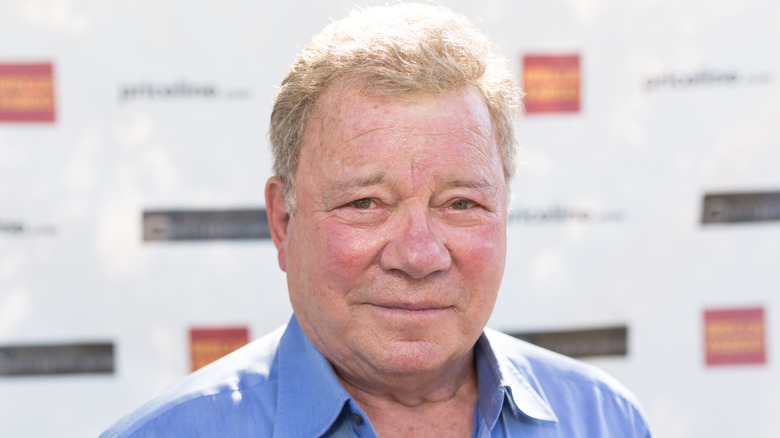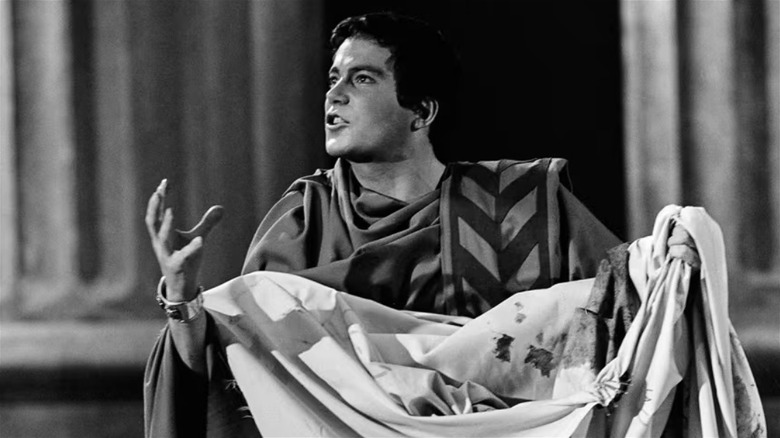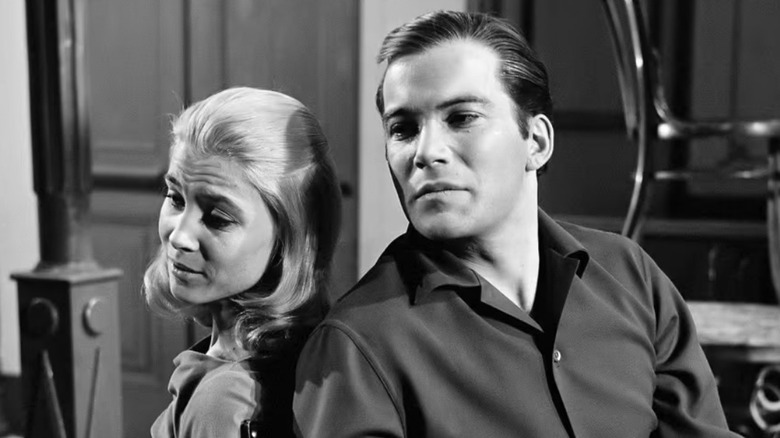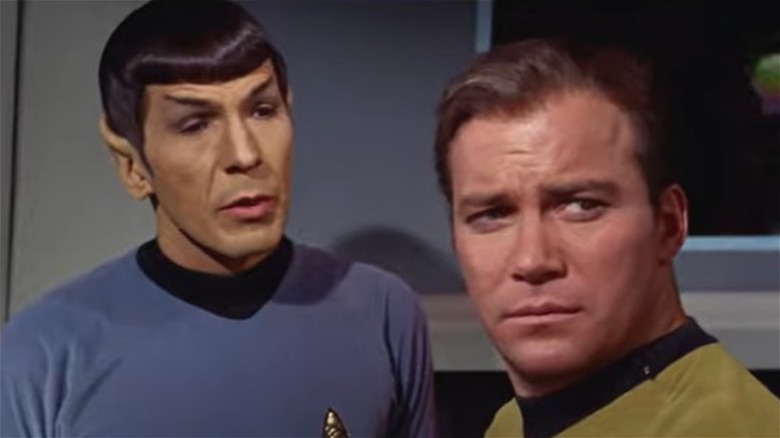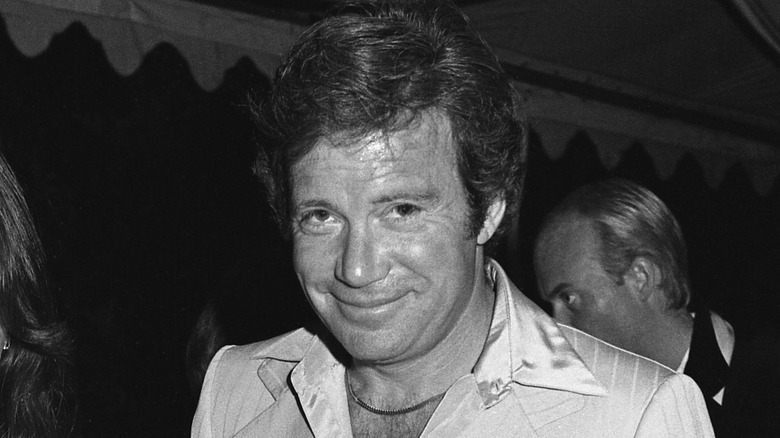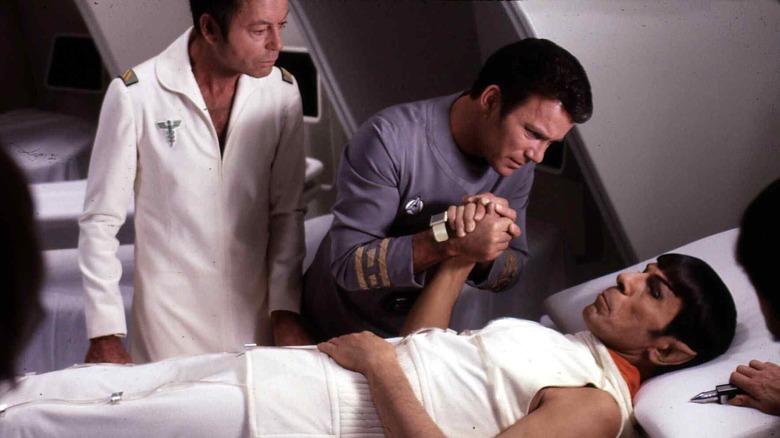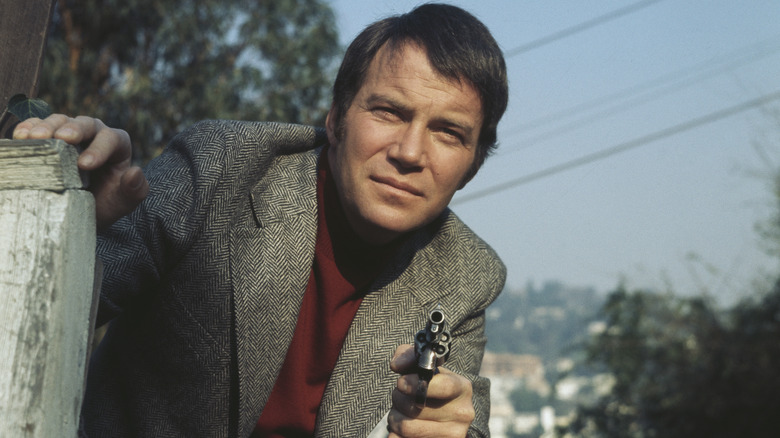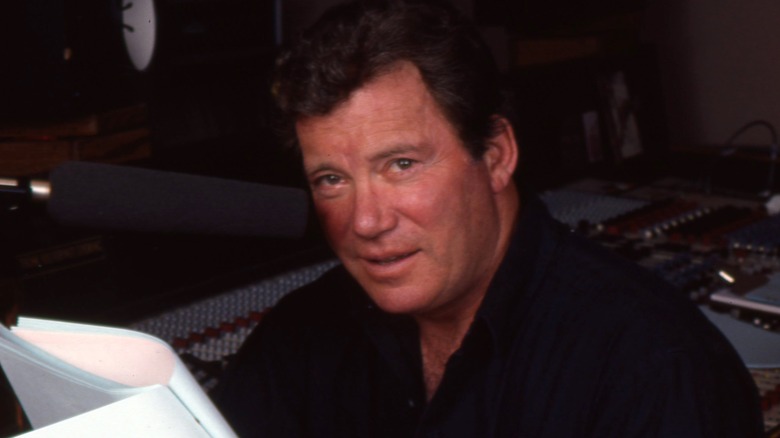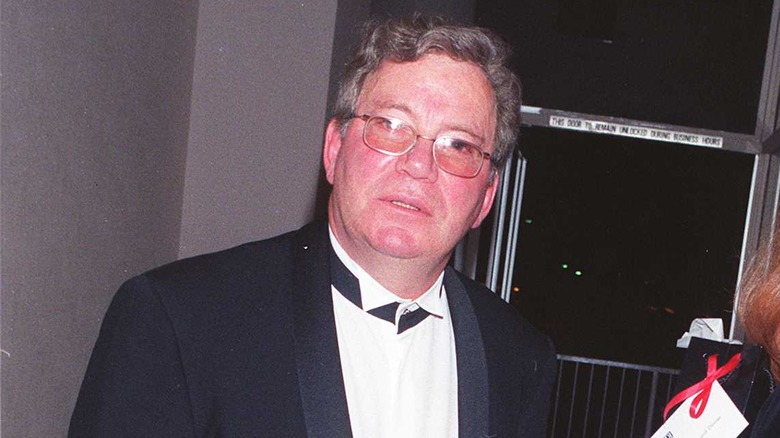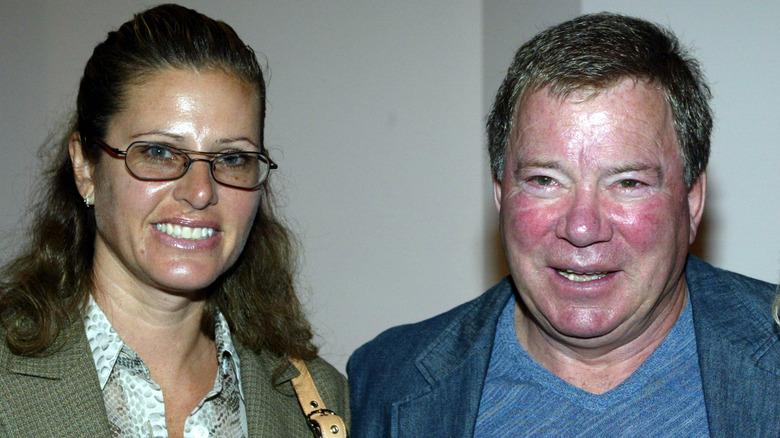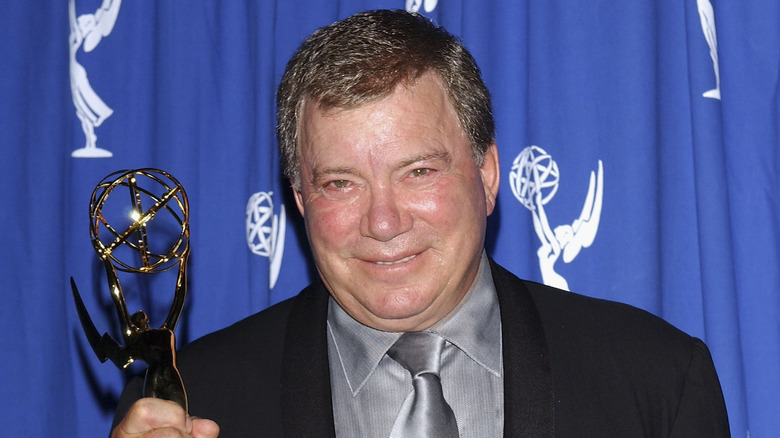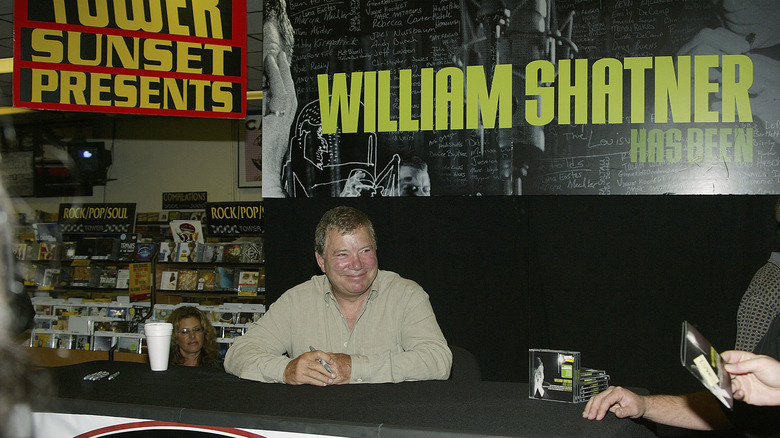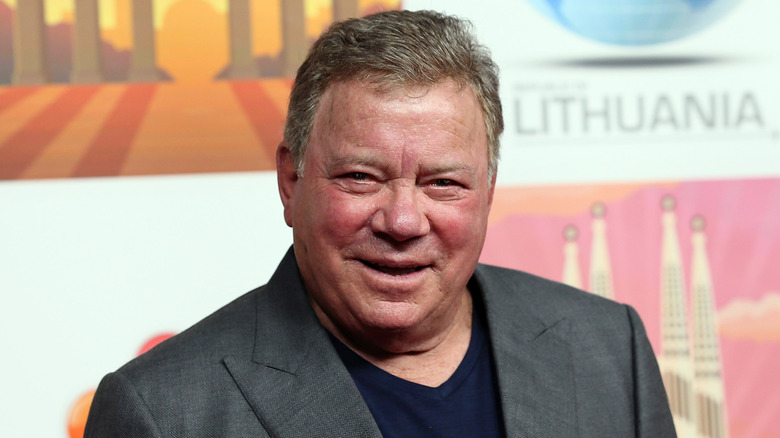The Stunning Transformation Of William Shatner From 25 To 92
When you think of an actor in the truest sense of the word, William Shatner is the one who immediately comes to mind. Born in Montreal in 1931, Shatner established himself as a stage actor in his native Canada before heading to Broadway, then Hollywood. Amassing an array of screen credits spanning from the 1950s until the present, Shatner has been the ultimate Hollywood survivor, reinventing himself time and again.
While some of his peers may have become enmeshed in the past, Shatner has consistently displayed a keen fascination with the world around him, including the latest emerging technologies. That's been true of social media, where the prolific tweeter has gathered 2.5 million followers for his X, formerly known as Twitter, account. He also delved into the world of NFTs in 2023, and opined about appearing on the screen via AI. "It's an interesting question," Shatner told Comic Book. "If I'm alive, I don't want AI to do that, but if I'm dead and they ask my family and they're going to pay my family very well to sound like me, I would advise them to say yes."
Over the course of his decades in the spotlight, Shatner has pulled off the tricky feat of remaining relevant, year after year. To find out more about the legendary actor's spectacular journey through life, take a look at the stunning transformation of Shatner from age 25 to age 92.
William Shatner performed Shakespeare in his native Canada
William Shatner was an ambitious young actor when he was tapped to join Canada's prestigious Stratford Festival, renowned for its acclaimed productions of Shakespeare's plays. Shatner performed in various productions during his three years with the festival, but his big break came while he was serving as understudy for fellow Canadian actor Christopher Plummer in a 1956 production of "Henry V." "I was understudying Chris Plummer — and they said, 'Plummer's ill. Can you go on?' And I had never rehearsed the part, never spoken the part out loud. And I went on," Shatner recounted in an interview with NPR.
Despite his lack of rehearsal, Shatner won rave reviews, catapulting him from supporting roles in the festival to leading ones. "He became an overnight sensation," Stratford Festival artistic director Antoni Cimolino told The Stratford Beacon Herald. Shatner returned to Stratford in 2013 to accept a legacy award, where he reminisced about making his mark by filling in for Plummer. "It was a magical time," Shatner recalled in his speech (via CTV News), but admitted that his youthful hubris had quite a bit to do with his career-making understudy performance. "I look back on that and I think I would never do that now. Are you kidding me?"
When the festival's production of playwright Christopher Marlowe's "Tamburlaine the Great" – in which Shatner played Usumcasane, king of Morroco — was taken on tour to Broadway, Shatner was poised to climb the next rung of the showbiz ladder.
Breaking through on Broadway, then heading to Hollywood
After his brief Broadway run in "Tamburlaine," William Shatner was cast in another Broadway production in 1958, landing a starring role in "The World of Suzie Wong." It didn't take Shatner long to begin fearing his big break would end his career before it even had a chance to begin. "We were panned universally. It was a very turgid drama," Shatner told the South China Morning Post. "Over the next months we cut 15 minutes from the running time and changed the reading of the lines from being a turgid drama to essentially a comedy." These changes proved to be essential for the production. "So instead of closing the night we opened ... it ran for [nearly] two years. It became a major success."
Shatner then landed another leading role on Broadway in 1961, in the comedy "A Shot in the Dark," which ran for nearly a year. He also began making some inroads in Hollywood, being cast in some major films. These included playing one of the titular siblings in "The Brothers Karamazov," and "Judgement at Nuremberg," part of a star-studded cast that included Spencer Tracy and Judy Garland.
Shatner also began racking up roles in TV series. Arguably the most memorable of these was his 1963 turn in "The Twilight Zone," portraying a jittery airline passenger who sees a monster on the wing of the jet — which nobody else can see, leading the rest of the passengers and the flight crew to believe he lost his mind.
The role that changed Shatner's life
In 1966, William Shatner landed the starring role in a new sci-fi TV series that would change his life in ways he couldn't even begin to imagine: Captain James T. Kirk on "Star Trek." The show was a modest hit that was canceled after three seasons, yet that was far from the end. "Star Trek" lived on via reruns, which caused its popularity to explode after its cancellation, spawning fan conventions and leading Shatner to become forever associated with the swashbuckling starship captain. "It's such a show biz phenomenon. It arose like a phoenix after it was canceled," he gushed in an interview with Sarasota.
During the post-"Star Trek" period, Shatner's career floundered; ironically, as those "Star Trek" reruns continued to captivate viewers, the former Captain Kirk found himself typecast. To make ends meet, he appeared in guest spots on various TV series and took whatever theater gigs he could scrounge up. "It was the early 1970s and I was recently divorced. I had three kids and was totally broke ... I lived out of the back of my truck," he told Details (via TrekMovie.com).
Yet Shatner persevered and rebuilt his career role by role, including reprising Kirk in the 1973 animated "Star Trek" Saturday-morning series. In 1975, he was cast in his first TV starring role since "Star Trek," in the short-lived series "The Barbary Coast," and headlined the 1977 horror classic "The Kingdom of the Spiders." But something big was on the horizon.
Rocket Man predicted his shift to comedy
In 1978, William Shatner hosted the Saturn Awards, honoring the best in science fiction on film and television. He performed Elton John's hit single, "Rocket Man," delivering the song in a combination of singing and mock-dramatic spoken word recitation that would eventually become his trademark. While the clip didn't become widely circulated until years later — becoming a viral sensation in the internet age — his keen comedic timing was on full display to anyone who watched. Artfully smoking a cigarette while adding his Shatner-esque emphasis to the lyrics, he was eventually joined by a '70s-era special effects second Shatner, and then a third.
Casting directors soon came to see the former Broadway actor in a different light. This was evident in the comedic roles he took in the early 1980s, including playing himself on the sitcom, "Mork & Mindy," and, most notably as the over-the-top Commander Buck Murdock in the big-screen comedy spoof, "Airplane II: The Sequel."
Meanwhile, the second life that his "Rocket Man" performance received — 40 years later, courtesy of YouTube — apparently took Shatner by surprise. Becoming a classic performance ("Family Guy" did a shot-by-shot animated homage), the actor felt the whole thing was somewhat embarrassing. "So I was just kidding around," said Shatner during an appearance on CNN's "Who's Talking to Chris Wallace?" (via Heavy). "I didn't know they were recording it. They released that thing."
Reviving Captain Kirk on the big screen
As those relentless reruns of "Star Trek" episodes solidified the show's status in the pop-culture landscape, plans were eventually formulated for a movie. The result was the 1979 release of "Star Trek: The Motion Picture." The film's success at the box office led to a sequel, 1982's "Star Trek II: The Wrath of Khan," which also proved to be a hit. More movies followed, with William Shatner himself directing "Star Trek V: The Final Frontier." That was followed by "Star Trek VI: The Undiscovered Country," the final movie to feature Shatner and the original cast from the series.
Shatner portrayed Captain Kirk one final time in the 1994 feature, "Star Trek Generations," in which Kirk encounters the future crew of the Enterprise — from the hit TV spinoff "Star Trek: The Next Generation" — and ultimately meets his maker. According to Shatner, he wasn't exactly on board with the decision to kill off his most iconic character.
"Well, I didn't think I had any choice in the matter," Shatner told Comic Book. "Paramount had decided that the ceiling that they could reach in our box office had been reached and they thought that by putting in 'The Next Generation' cast, that they would reach a higher box office. That decision had been made. It was either I was going to appear and die, or they were going to say he died. So, I chose the more practical of the two."
Shatner embarked on a TV comeback
After the success of the first two "Star Trek" movies, William Shatner returned to TV with another series, the 1982 cop show "T.J. Hooker." In the role of the titular cop, Shatner's new character resonated with viewers, and the series ran for five seasons, ending in 1986.
Interviewed by Forbes in 2021, Shatner revealed there had been attempts to revive "T.J. Hooker," but nothing that had ever come to fruition. "A reboot has been in the works a couple of times, but it hasn't happened so far," he said. "Hooker has to run fast, and he has to jump, and I don't jump as well as I used to do. If I could walk quickly or the bad guy would slow down, I might catch him," he joked. "Seriously though, I don't know. Maybe I'd be behind a desk, I was the boss, and I'd pound my hand on the desk every so often to show you I was still alive."
In 1989, Shatner was tapped to host "Rescue 911," a trailblazing reality show showcasing actual emergences and the 911 calls that alerted authorities, via interviews with the people involved and dramatic re-enactments. Shatner once again found himself involved with a television hit, as the show ran for seven seasons until its cancellation in 1996. As the biography, "Shatner," revealed, the show didn't require much of Shatner's time; he typically shot his intros every other Sunday in an actual 911 call center.
He rebranded himself as an author
In 1989, William Shatner published his first novel, 1989's "TekWar," accompanied that same year by "Captain's Log," his first-person account of directing and starring in "Star Trek V." He followed that with two more "TekWars" books both in 1991 and then the 1992 novel "Believe," a fictional account of Sherlock Holmes author Arthur Conan Doyle and escape artist Harry Houdini engaged in a contest seeking proof of life after death.
In 1992, William Shatner signed a deal with HarperCollins to write a book about his experiences with the original "Star Trek" series. The result was his 1993 book, "Star Trek Memories," co-written with Chris Kreski. The book's success opened a new door for Shatner, who quickly wrote a follow-up, "Star Trek Movie Memories," along with a few more "TekWar" novels. Interestingly, those novels spawned a TV series in the mid-1990s, with Shatner naturally casting himself in a starring role).
As of early 2024, Shatner has written over 40 books. These include several "Star Trek"-themed novels (set in an alternate timeline in which Captain Kirk didn't die, known as his "Shatnerverse" series), another about his complicated relationship with "Star Trek" co-star Leonard Nimoy (2016's "Leonard"), and another on his experience with Trekkie fandom, 1999's "Get a Life!"
He spoofed himself in Free Enterprise
William Shatner took an intriguing left turn in the 1998 film, "Free Enterprise," a low-budget indie in which he played himself — albeit an utterly bonkers version. In the film, Shatner encounters two nerdy adult fans (one of whom is played by future "Will & Grace" star Eric McCormack), gifting them with his skewed life lessons. His take on himself was revelatory, spoofing his public persona in what has since come to be considered a cult-hit meta masterpiece.
"Free Enterprise" opened the door to a comedy career, including Shatner's Emmy-nominated recurring role in sci-fi sitcom "3rd Rock from the Sun," a hilarious supporting role in Sandra Bullock's "Miss Congeniality," and playing himself (again) opposite Eddie Murphy in the 2002 comedy "Showtime." Shatner's comedic skills were also put to use by Priceline as the online travel-booking service's commercial pitchman, appearing in an array of funny commercials during his two-decade stint with the company.
"The evolution of the marketing campaign to this moment now — this character, the Negotiator, now no longer is Shatner playing a guitar and singing a song and therefore you say, 'Isn't he funny' or 'Isn't that terrible,'" Shatner told the Associated Press (via CBS News). "You say, 'That's this figure from Priceline who's our ombudsman. He's trying to get us a better price.' And I'm losing the identity of Shatner and becoming the frontispiece for the company."
His wife's tragic death
William Shatner has had a lot of experience with matrimony. His first marriage to Gloria Rand ended in 1969, resulting in the couple's three daughters, Leslie, Lisabeth, and Melanie. He then married Marcy Lafferty in 1973, divorcing more than two decades later, in 1996.
The following year, he married his third wife, fellow actor Nerine Kidd. Tragically, Kidd died in 1999, drowning in the swimming pool of their home. Shatner later revealed that she dealt with alcohol addiction and had been to rehab twice during their marriage. Speaking with The Sydney Morning Herald in 2008, Shatner revealed that his "Star Trek" co-star Leonard Nimoy called him shortly before the wedding, warning him not to get married. "He said just one sentence, 'Bill, you do know that Nerine is an alcoholic,'" Shatner said, recalling he told Nimoy that he knew, but loved her. "Leonard didn't speak for a minute and then he said, sadly, 'Well, Bill, then you are in for a rough ride.'"
While an autopsy subsequently ruled out foul play, revealing high levels of sleeping pills and alcohol in Kidd's bloodstream, Shatner was initially viewed as a suspect in his wife's death. "Can you imagine what that was like?" he told the outlet. "The media was asking, 'Did Shatner kill his wife?'" Shatner later honored his late wife by purchasing an LA home for people in recovery, the Nerine Shatner Friendly House.
If you or anyone you know needs help with addiction issues, help is available. Visit the Substance Abuse and Mental Health Services Administration website or contact SAMHSA's National Helpline at 1-800-662-HELP (4357).
Shatner's Emmy recognition for Boston Legal
Back in 2004, William Shatner booked a guest-starring gig on the TV legal drama, "The Practice," portraying a legendary, yet wildly eccentric attorney named Denny Crane, who tended to proudly blurt out his own name. The character proved to be so popular with viewers that a spinoff was launched that partnered Shatner with James Spader, the legal dramedy "Boston Legal." The show was a ratings success and a critical darling, airing for five seasons before ending its run in 2008.
Denny Crane fit Shatner like a glove, allowing him to inhabit what became his second best-known screen character (after Kirk, of course). "I remember one moment he was giving himself Botox injections, and something surprised him so he turned around in his chair and had a Botox needle sticking out of his forehead," Shatner told NPR. "In one moment, he's totally lucid, and in the other, he's totally insane. How extraordinary — what a character to play!" Meanwhile, Denny Crane brought Shatner two things that James T. Kirk had not: a pair of Emmy Awards, one for his guest-starring role in "The Practice," and another for supporting actor for the spinoff series.
Shatner followed that up by starring in his first-ever sitcom, "$#*! My Dad Says," making its debut in the fall of 2010. Shatner's sitcom was not nearly as well received as his previous show and bit the dust after just one season on the air.
An unexpected career in music
Back in 1969, William Shatner released an album called "The Transformed Man," which melded his covers of pop songs with passages from Shakespeare and other theatrical classics. Years later, some of the tracks from that effort appeared on a 1988 compilation album called "Golden Throats," collecting terrible cover songs performed by actors — including Shatner's now-legendary rendition of The Beatles' "Lucy in the Sky with Diamonds."
In 2004, he released "Has Been," a collection of songs he wrote and performed with musician Ben Folds. Rather than the kitsch that fans may have expected, the album was self-deprecatingly self-aware and even sadly poignant (the track "What Have You Done," about his wife's death). The album was no novelty project, and featured contributions from the likes of Joe Jackson, Aimee Mann, and Brad Paisley, along with a song penned by "High Fidelity" author Nick Hornby.
The positive reviews spurred Shatner to record more music. Other albums have included 2008's "Exodus: An Oratorio in Three Parts" (featuring Shatner reciting Bible passages while accompanied by a symphony orchestra), "Seeking Major Tom" (a 2011 collection of space-themed covers), and 2013's "Ponder the Mystery," Shatner's exploration of progressive rock. He also went on the release the 2018 country album "Why Not Me," a collaboration with Alabama's Jeff Cook, and later that same year made his Yuletide-themed holiday album, "Shatner Claus."
He returned to Broadway with a one-man show
In 2012, William Shatner returned to the Great White Way more than 50 years after making his Broadway debut. This time, he was the sole performer, headlining in his one-man show, "Shatner's World: We Just Live in It." In a statement to Playbill, Shatner ruminated on performing on Broadway for the first time since 1962. "I've been pretty busy since I last played the Music Box," he pointed out. "I've been refurbished; I hope the theatre has been too. My plan has always been to return to Broadway every 50 years. I can't ask my fans to wait for me longer than Halley's Comet, so I'm coming back."
As a review from The Hollywood Reporter noted, Shatner served up a brisk recap of his life to date, with video clips and photos from his past serving as his visual accompaniment. The seasoned actor concluded the show by singing (in his patented talk-sing Shatner style, of course) his Brad Paisley-penned "Has Been" track, "Real."
For Shatner, the show allowed him the opportunity to revisit the various twists and turns of his life, while also exploring some big questions, including his own mortality. "I riff on all kinds of subjects, from motorcycles, to music, to horses, to love, to death, it's a show that appeals to a lot of people and it's been getting great reaction," he told Broadway World.
His celebrated his lifelong passion for horses
William Shatner rode a horse for the first time when he was 12 years old while growing up in Montreal and took to it immediately. "I had an affinity from a very early age," he recalled during an appearance on "The Rich Eisen Show." However, it wasn't until he was older and had amassed a few bucks that he was really able to indulge his admittedly expensive passion for owning, breeding, and riding horses. "Horses have been an extraordinary event in my life, but a gradual one," he told The New York Times.
In 2017, Shatner celebrated his lifelong love of horses when he unveiled his book, "Spirit of the Horse: A Celebration in Fact and Fable." As he told Fox 11, the actor credited his horseback-riding habit for contributing to the youthful vigor he has displayed during his golden years. "The horses are different, in that I get up and want to be at my physical best because the horses are demanding," he said. "So there's a real motivation for staying in shape and getting up in the morning and trying to do something."
This encouragement towards fitness was particularly true when Shatner competed in equestrian events, which prevented him from getting sedentary. "I'm a competitive rider in an equine skill called reining," he told The Guardian. "I don't know if you know it, but it's very athletic and cowboyish."
The philosophy he embraced at 90
In March 2021, William Shatner celebrated his 90th birthday. He marked the occasion by being interviewed by Tom Power on "Q," and the actor admitted his disdain for his advanced age. "It's disgusting," he declared. "It's a disgusting number. I mean, I don't like 90. When I heard that 90 was coming up, I thought, 'What the heck is that?' I remember 90 way back when I was in Canada and I thought, '90! People don't live till 90.' And here I am."
Later that same month, he returned to the big screen with a starring role in the feature film, 'Senior Moment." That October, he became the oldest living person to travel to space when he blasted off in Jeff Bezos' Blue Origin space shuttle. Clearly, becoming a nonagenarian hadn't slowed down Shatner one iota. In 2023, he returned to television as host of the Fox reality show "Stars on Mars," in which various celebrities experienced the simulated conditions that astronauts would face when colonizing Mars.
Interviewed by The Guardian just a few weeks after his 90th birthday, Shatner was asked what he learned by 90 that he wished he had known when he was 20. "I'm glad I didn't know because what you know at 90 is: take it easy, nothing matters in the end, what goes up must come down," he posited. "If I'd known that at 20, I wouldn't have done anything!"

